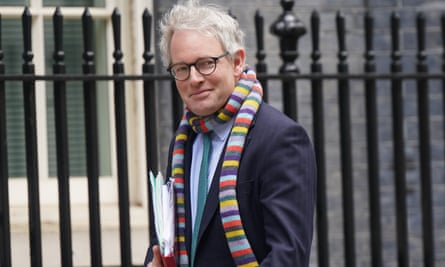‘A big gamble’: Rishi Sunak’s Rwanda plan faces crunch week in Commons | Immigration and asylum
- Politics
- January 15, 2024
- No Comment
- 264
Just before MPs were due to vote on the Rwanda bill at second reading last month, Conservative whips called party moderates in to see them one by one.
Their message was bleak. The government had just unexpectedly lost a vote on the infected blood scandal and, with dozens of rightwingers threatening to rebel over the Rwanda plan, the whips warned they might lose this one, too. If that happened, they said, it could be the end of Rishi Sunak’s premiership.
“They were worried they no longer had control of the numbers and were not sure they were going to win,” said one of those involved in the last-minute talks. “They told us we had to vote with the government, or it might just fall.”
The stark warning underlines just how important it is to Sunak that the Rwanda bill – which comes back for a series of votes this week during its committee stage and crucial third reading – passes unscathed through parliament.
The prime minister’s plan to tackle small boat crossings relies on being able to deport asylum seekers to the central African country. But, as he approaches this week’s vote, he faces rebellions from both the right and centre of his party.
For rightwing backbenchers, the bill does not go far enough in stopping legal appeals against deportation. For many members of the centrist One Nation group, the entire premise of the bill undermines domestic and international law.
In the days before the bill’s second reading in the Commons last month, the atmosphere among Tory MPs was febrile. Yet the prime minister avoided a rebellion, with the bill passing by 313 votes to 269.
For the bill to fail, it would have required just 29 Tory MPs to vote against or 57 to abstain. In the end, not a single one of Sunak’s MPs voted against and just three dozen abstained.
Afterwards, the leaders of the so-called “five families” of rightwingers claimed they would give the government the chance to “toughen up” the bill, but would oppose it at the next opportunity if they didn’t get what they wanted.
Three of them – Danny Kruger, John Hayes and Mark Francois – on Sunday urged colleagues to stand firm in backing rebel amendments, hailing back to their success in stopping the Theresa May Brexit deal.

Hayes told the Guardian: “The prime minister is captain of the team and he set the missions and defined the objectives. He didn’t say reduce the boats, or curb the boats, he said stop the boats.
“Since he’s gone ahead with that, he’s got to have a legislative vehicle to makes that happen and, currently his bill doesn’t, our amendments do.”
The rightwing rebels say that as many as 70 MPs – including a handful of junior ministers – could back their amendments to the bill on Tuesday, warning the prime minister he will have “nowhere to go” if he doesn’t toughen up the legislation.
They have also warned that without changes, MPs who abstained last time would vote against the Rwanda bill at third reading, their numbers bolstered by other sympathetic rightwingers who had initially backed it.
Yet MPs on the One Nation wing are sceptical that the right has the numbers, even though Labour is opposing the legislation. “The technical term for that theory,” one told the Guardian, “is ‘bollocks’.”
Another pointed out that the hard right had said that it had as many as 100 rebels before the last vote and shrugged: “They can shout as loud as they like but, if they don’t have the numbers, it won’t change anything.”
There has, in fact, been relatively little shouting so far. Since the last vote, Sunak, his home secretary, James Cleverly, and the immigration minister Michael Tomlinson have – along with aides – been assiduously trying to win over Tory critics.
Government insiders have drawn comparisons with the run-up to the Windsor framework vote, in which a cabal of Brexiters led by Boris Johnson and Liz Truss threatened a rebellion that fizzled out. One reflected: “How many times have they said: ‘Look out for our army, it’s coming over the hill’?”
They added: “I’m not going to claim that we’re rock-solid confident. But there is not a whiff of panic about it all at the moment.”
after newsletter promotion
One minister observed that the “heat has come out of” the debate over Christmas, with most Tories accepting that given the prime minister’s promises, they need to get at least one flight to take off to Rwanda before the election.
Sunak told the Sunday papers he was “determined to stick it out” on the bill, despite the opposition from some in his party, adding: “I’m confident it will work and the key is just to get it up and running as quickly as possible.”
There also remain questions over the motives of rightwing rebels. “There’s a group that would oppose the bill because it’s a smack on the nose to Rishi,” one aide said. “They need to ask themselves what’s their next move if they pull the trigger in an election year.”
The former home secretary Suella Braverman is one of those who has said she will oppose the legislation unless it is amended. But most of her colleagues believe she is more interested in disrupting Sunak’s leadership to pave the way for her own.
Senior figures also point out that several of those who abstained last time, such as Tobias Ellwood and Caroline Nokes, are on the One Nation wing of the party and did so because they felt the legislation went too far, rather than not far enough.
Other centre-right MPs backed it last time but don’t intend to this time round. “I voted for it once because the government was at risk,” said one moderate MP. “But I won’t do so again.”
However, most MPs in the 100-plus strong One Nation bloc are willing to accept the existing drafting as long as there are not any further concessions to the right. Combined with Labour MPs, they do have the numbers to vote the flagship legislation down.
The former justice secretary Robert Buckland has tabled his own amendment to make the bill more compatible with international law. Some believe this could give Downing Street a helpful excuse to reject proposals from both left and right of the party, in the spirit of fairness.
But the government has not done so yet. “We haven’t said no because there’s still material they’d like us to look at,” one aide said. But expectations of any changes being agreed remain low.
Even if this week does end up being something of a damp squib, with the bill passing unamended, there is still a long way to go, with a battle ahead in the House of Lords.
While Tory aides claim they have drawn up a “bomb-proof” list of dozens of people to be deported on the first flight, legal challenges also remain almost certain, potentially snarling up Sunak’s Rwanda plan in the courts until after the election.
“Even if the bill does make it through this week,” said one senior Tory, “Rishi isn’t out of the woods yet. He’s taken a big gamble sticking with the Rwanda plan and it might not pay off.”
#big #gamble #Rishi #Sunaks #Rwanda #plan #faces #crunch #week #Commons #Immigration #asylum









